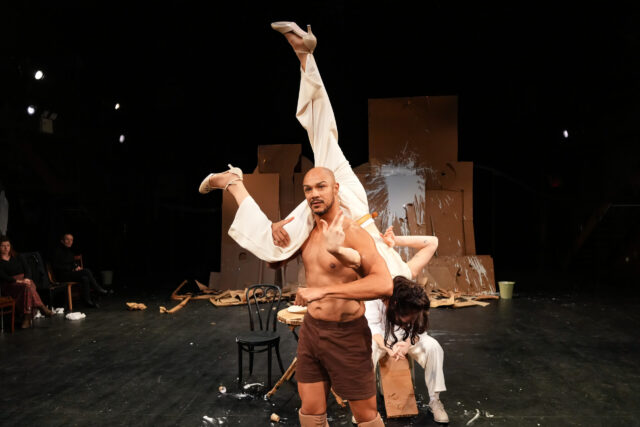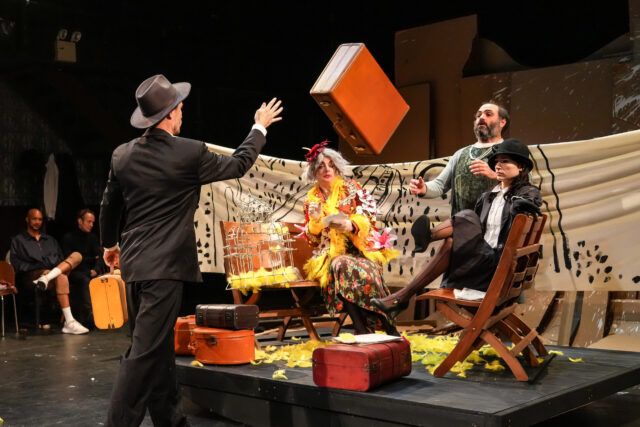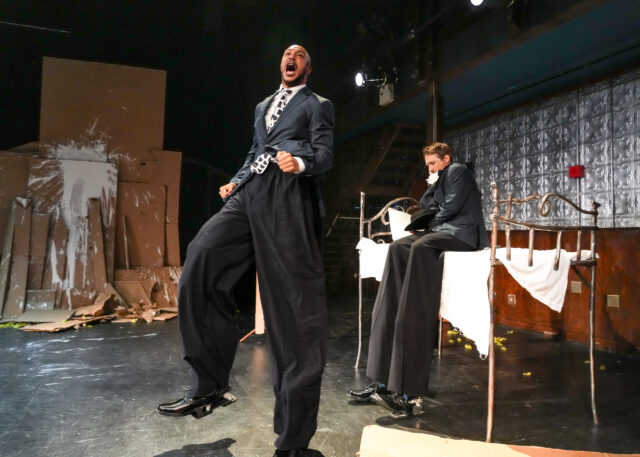
Krymov Lab NYC makes big debut with the two-part Big Trip at La MaMa
BIG TRIP
La MaMa Experimental Theatre Club
The Ellen Stewart Theatre
66 East Fourth St. between Second Ave. & Bowery
September 24 – October 15, $45
212-475-7710
www.lamama.org
www.krymovlabnyc.com
Moscow-born director, designer, and visual artist Dmitry Krymov makes a smashing debut with his new company, Krymov Lab NYC, in Big Trip, two shows running in repertory at La MaMa through October 15.
Krymov was preparing a production of The Cherry Orchard in Philadelphia in February 2022 when Russia invaded Ukraine. Condemning Putin’s actions, he became an exile and moved to New York City with his wife, Inna, where he started Krymov Lab NYC. The first part of Big Trip is Pushkin “Eugene Onegin” in our own words, an absurdist adaptation of Alexander Pushkin’s classic serial novel in verse, following the adventures of four Russian émigrés in downtown Manhattan.
You don’t need to have seen the first part to fall in love with the second, Three Love Stories Near the Railroad, Krymov’s wild and woolly, wholly unpredictable retellings of Ernest Hemingway’s four-pages-each “Hills Like White Elephants” and “A Canary for One,” followed by act two, scenes two and three of Eugene O’Neill’s Desire under the Elms.
With a dash of Brecht here and a dollop of Ionesco there, Krymov brings a circusike atmosphere to La MaMa, where most of the audience sits in rising rafters but some in semicircular rows on the stage. Emona Stoykova’s set is anchored by a dilapidated wall of cardboard splashed with white paint, with random objects on the floor buried in the rubble.
Host and guitar player Jackson Scott introduces the show. He constructs a table and chairs from the detritus. He tells clarinetist Erich Rausch that he’s not supposed to be here tonight and that the union will not allow him to get paid if he stays. The cast of nine sits stage right and makes costume changes in front of the audience because, as Jackson explains, “The dressing rooms at La MaMa are incredibly far away, and the last time we did this show, sometimes the actors didn’t manage to get here in time for their entrances. So that’s why they are all going to sit here, alright?”

Props are casually tossed around in Dmitry Krymov’s unpredictable Big Trip
Jackson orders the audience not to clap until all three works have concluded. “It is one single piece, like a symphony,” he says. Jackson also unveils the train, a model that putt-putts across the stage in the back.
Thus, right from the start, we are aware that this evening will be as much about the art of making theater as it will be about the art of performance itself.
In “Hills Like White Elephants,” a young couple (Tim Eliot and Shelby Flannery) is on a train going from Madrid to Barcelona. Although they never say the word abortion — echoing O’Neill’s 1914 one-act, Abortion, in which the title word is never uttered — it appears that they are on their way to end the woman’s pregnancy. “I know lots of people who have done it and it’s really very simple,” the man assures the woman. “And things will be like they were and you’ll love me again?” the woman asks. They order two Budweisers in a café and the bartender (Jeremy Radin) brings them two cups of shaving cream. A tall, bare-chested man (Kwesiu Jones) representing the unborn child dances around the woman and lays his head in her lap.
In “A Canary for One,” the bartender has taken over the narration, complaining about his disintegrating underwear. A man and a woman (Eliot and Flannery) are on their way to Paris to end their marriage. In their compartment is an older American woman (Annie Hägg) traveling with a shedding yellow canary. The scenery unfolds behind them from a scroll pulled open by an assistant named Shlomo (Anya Zicer) consisting primarily of black-and-white drawings of houses, people, and landscapes, as the host relates the tale, with limited spoken dialogue. Inventive things are done with luggage, cigarettes, and bread as the train continues on its way.

Big Trip concludes with scenes from Desire under the Elms
The evening finishes with a farcical reinvention of two scenes from Desire under the Elms involving the elderly Ephraim Cabot (Jones); his young wife, Abby (Flannery); and Ephraim’s ne’er-do-well son, Eben (Eliot). Cabot berates his son, calling him “a waste of my seed.” Abby loves Eben, who only has eyes for his dead mother. Ephraim and Eben walk around on long metal stilts, making movement comically difficult and ridiculous as they tower over Abby. Beneath all the pain and anguish, Abby has hope. “I hate you. I don’t need anything from you,” Eben tells Abby, who replies, “Don’t lie to me. I could feel the tenderness in your hands.”
The ninety-minute Big Trip is fun and frantic, filled with delightful non sequiturs, playfully silly song and dance, and hilarious self-referential nonsense. Each member of the crew deserves kudos: The choreography is by Baye&Asa and Rachel McMullin, with costumes and puppets by Luna Gomberg, sound by Kate Marvin, lighting by Krista Smith, and projections by Yana Biryukova.
The play also has a serious edge, with a dark take on relationships, whether between husband and wife or parent and child. Both Hemingway stories are drawn from his seminal 1927 collection, Men without Women, published just as Hemingway was gaining success as a writer, during the three-year period that included The Torrents of Spring, The Sun Also Rises, and A Farewell to Arms as well as his divorce from Hadley Richardson and marriage to Pauline Pfeiffer, the second of his four wives. Desire debuted in 1924, while O’Neill was married to the second of his three wives, Agnes Boulton.
“They never know what they want, these directors,” the host tells a stagehand. But writer, director, and adaptor Krymov knows precisely what he wants, even amid improvisation, building a unique kind of theater by exposing and transforming its conventions. As the script notes about “A Canary for One”: “This is a small scene. It doesn’t even pretend to be a play. It’s an idiotic, very small scene. But it is honest about what it is.”
[Mark Rifkin is a Brooklyn-born, Manhattan-based writer and editor; you can follow him on Substack here.]